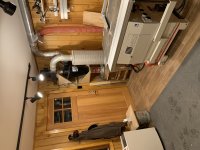HowardH
Member
new update. After 3 weeks, the new capacitor blew. Felder was asking if the power to the unit was consistent which I believe it is. It ran fine for 2 years without a hiccup and now it blew out twice. They want me to hire an electrician to look at the connections and check the power. They also charge $110 per hour to diagnose and that's probably throwing good money after bad. Thinking something is wrong with the motor. My sales guy is asking the factory guys what else could be the problem. If they say it needs a new motor I'm probably just going to throw the whole thing away as the only thing of value is the motor. I would imagine a new motor would come close to the cost of the entire unit. Very disappointing from what is supposed to be a high quality product from a high quality company.

